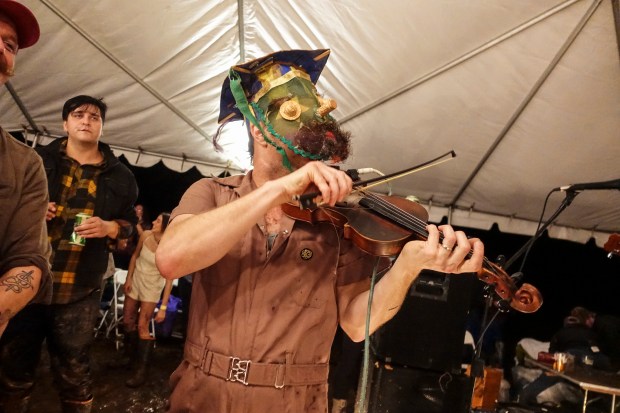Composer Michael Ruffino sat down with Parts Unknown producer Helen Cho to discuss how he creates an original, distinct soundtrack for each episode. This interview took place before Anthony Bourdain’s death.
Helen Cho: Mike, how would you describe what you do for Parts Unknown?
Michael Ruffino: I make original music for individual episodes. I’m the show’s composer, meaning my job is to deliver fully produced, mastered material for the show’s soundtrack. I’m sometimes involved when an episode includes music from a featured musician or band, but I don’t work with music libraries or do music supervision. My part is to work toward each episode having a distinct, cohesive soundtrack.
Cho: Take me through your process of making a track for Parts Unknown.
Ruffino: There’s the standard recording process—playing each instrument into the computer until it doesn’t suck; Googling why some piece of gear or software isn’t working; and, finally, hitting record two seconds before someone outside turns on a leaf blower or a car alarm goes off.
Depending on how familiar I am with the music I’ll be making and if I have time, I’ll do some research. Living in Los Angeles, you can pick up quite a lot of sound by just getting out of the house and exploring the different neighborhoods—hit up Little Armenia, Little Tokyo, Little Ethiopia, Thai Town, Filipinotown, flag down some passing mariachis.
Before I start recording, I’ll decide on a sound palette—a certain set of instruments or sounds to be used almost exclusively throughout the episode. Usually I begin by working up some kind of theme or motif that I can use to tie the music together in a way that supports the thrust of the episode.
Collaborating with musicians from other countries is its own rewarding process.
Beyond that, the nuts and bolts of what I do vary according to what’s needed. For example, [Zero Point Zero director and producer] Tom Vitale is in Thailand and needs a wong shadow–style [1960s Thai pop music genre] instrumental that a local can sing over for a scene he’s shooting in a Chiang Mai karaoke shack. For copyright reasons it can’t be an existing song, so my job is to come up with a track that sounds like it’s coming off heat-warped vinyl in 1973 and get it to Tom in time for the local singer to come up with lyrics in time for the shoot.
Collaborating with musicians from other countries is its own rewarding process. The process includes learning how to play or at least get useful sounds from instruments I’m not familiar with.
Cho: Do you watch entire cuts of the episode or specific scenes to score?
Ruffino: The production schedule is usually too tight for me to work on an entire cut. I try to deliver as many tracks as I can as early as I can to the editors, but by the time there’s a complete cut of an episode my job is pretty surgical and consists of tweaking or replacing music in existing scenes. How much of the show I see depends mostly on the editor’s preferred work process and what’s happening in the editing room. Sometimes I’m in the loop from the get-go. Other times I’ll get a look at an act or two early on and I’ll get some idea of the tone and pacing of the episode. Then I get select scenes to score as we go. And often enough I’m more or less winging it, with a high degree of confidence that the pieces will fall into place.

Cho: Do the editors, directors, or Tony give you notes on specific kinds of tracks they’re looking for?
Ruffino: Yes, they all do. Usually, I have a phone conversation with the editor and director as the edit gets underway. We’ll discuss thematic elements, vibe, or an arc if there happens to be one. There’s almost always a specific cinematic inspiration, if not an explicit homage to a certain director, at least a working reference.
The show can change in postproduction, sometimes drastically, and the music sometimes has to be adapted or revamped entirely. The prime mover is Tony, naturally. Most of the time he sends along a preliminary note about music, and typically I check in with him as I get rolling. Our musical and cinematic tastes and reference points are almost identical, so usually, a shorthand email is plenty. On the other hand, if we’re sitting somewhere with Negronis, our discussion of the show’s soundtrack might be quite lengthy, increasingly dynamic, and tangential.
Cho: And how much time do you get to record and mix the soundtrack?
Ruffino: About half the time I need and a sixth of the time I’d like.
Cho: What were the influences for the southern Louisiana episode?
Ruffino: Creedence Clearwater Revival. The live albums were in heavy rotation around the house. Also Elmo Williams & Hezekiah Early, Little Walter, and Slim Harpo came to mind. I did a couple of warped sort of Cajun dancehall tracks to supplement the music performed by local musicians in the episode.
Cho: Which scenes in the episode did you score?
Ruffino: I provided tracks more than I scored for this episode. The Gibson Standard guitar stylings of Mink Rockmoore feature in a couple of spots, like the airboat wild-hog hunt scene. Those tracks were all improvisation and were recorded live, just full crank in the room with beer and s*** falling all over. Restraint in Cajun country feels inappropriate.
This interview has been edited and condensed.